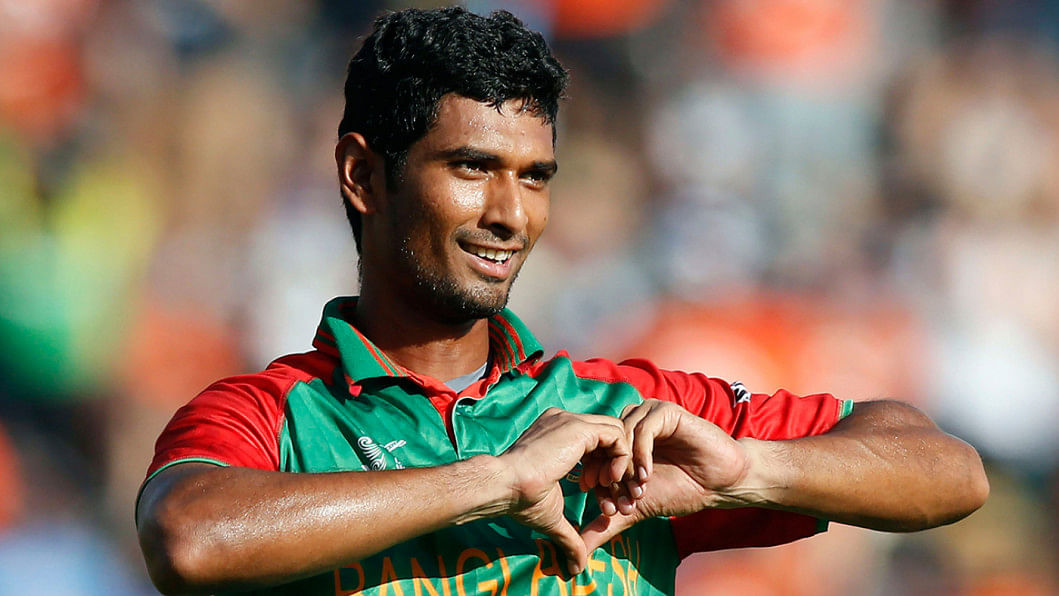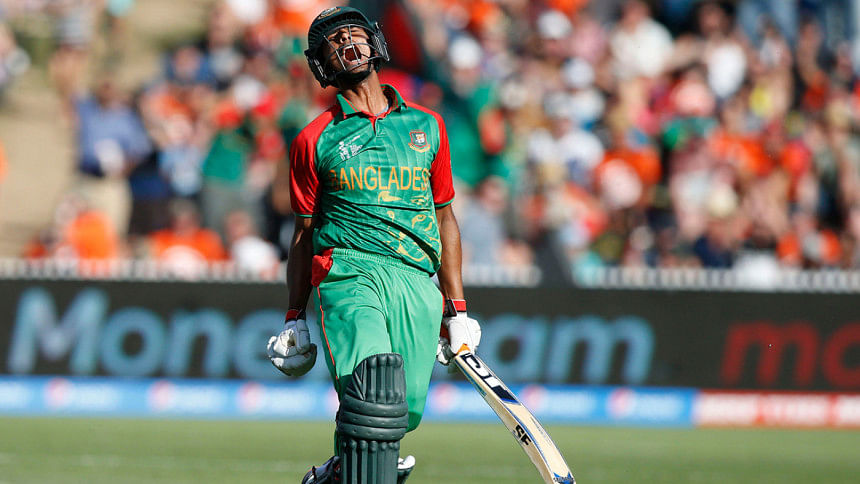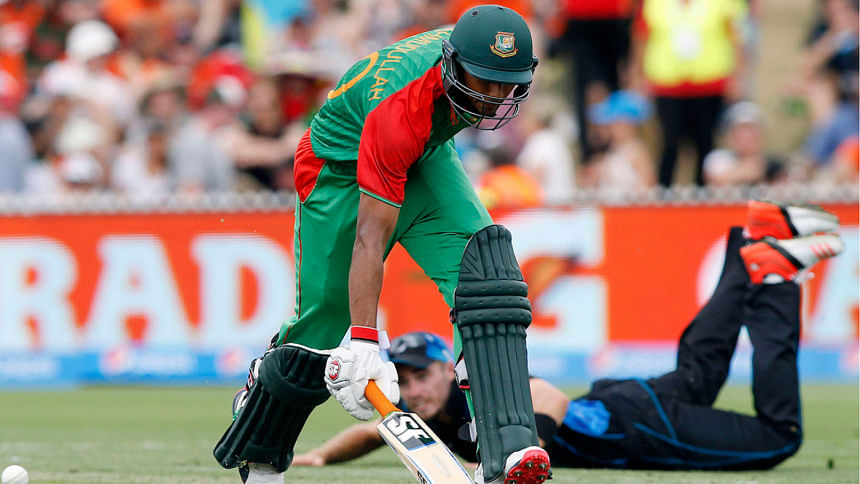Liberated Mahmudullah enjoys life at No. 4

Bangladesh's cricketers are known to be approachable and expressive, so fans feel a sense of familiarity about them: Shakib Al Hasan is the cool and reliable allrounder, Tamim Iqbal the aggressive opening batsman, Mushfiqur Rahim the chirpy wicketkeeper and Mashrafe Mortaza is passion and energy personified. They have also seen Shakib fume at a misfield, Tamim struggle to remain an attacking batsman, and Mushfiqur evolve as a batsman. And if any of them watched Mortaza goofing around during a break in training, all they would hear is laughter.
Bangladesh cricket doesn't really do inscrutable cricketers so Mahmudullah comes as a surprise. The only expression you will see from him all day will be a loud appeal or a double fist pump after taking a wicket.
Once, during a tense chase, Mahmudullah was ready to walk into the middle at the fall of a wicket but the not-out batsman, Shakib, gestured that he wanted the left-hander Suhrawadi Shuvo to come in instead. For a moment it looked like Mahmudullah would flip out. But he didn't.
He possesses a dry wit and has a fondness for the odd prank. Team-mates say he is in his element in the dressing room, but outside of it he rarely shows emotion, except probably when he danced the "Gangnam" one evening in Mirpur.
"He was such a clean hitter of the ball when he was a kid. I always told him that you have to bat in the top order. He is not like Shakib or Mushfiqur, who can start off with a boundary"
Khaled Mahmud
That was in late 2012 and for the next two years a dip in form sent him deeper into his shell. At least that's what it looked like from the outside. He scored only three ODI fifties between November 2012 and August 2014, and didn't score a Test fifty for nearly 12 months from March 2013. He remained in the side for most of this time, so his miserable run was there for everyone to see. Talk about him keeping his place because of his engagement to captain Mushfiqur's sister-in-law didn't help matters.
It's unlikely that anyone other than his team-mates, coaches and family members knew what was going on with Mahmudullah during his prolonged slump. He hardly spoke to the media. And given his reticent nature, it was hard to deduce what he felt. But cricket doesn't always let you bottle up your feelings for too long.
At his wit's end to find some runs with Bangladesh following on in St Vincent in September last year, Mahmudullah decided he had nothing to lose.
"That innings against West Indies, I was mentally charged up," Mahmudullah says. "I will go straight away up to the bowlers, I told myself. I will play like I did when I was a kid. I don't care who is bowling or what's in front of me. I am going to take him on. If I get out, I don't care. I was determined during that particular innings. I was having a bad time, but I thought what will happen will happen. I think from that point my confidence started to get better."
Dismissed for 7 in the first innings, he was still struggling to middle anything for the first 40 balls of the second innings. But once he drove a delivery past spinner Sulieman Benn, things turned in his favour. He started to drive and pull better and managed to reach his first fifty in months. He was dropped on 53 and added another 13 to his score before he was caught behind. But his three-and-a-half-hour stay at the crease and stand of 130 for the fifth wicket with Mushfiqur helped Bangladesh avoid an innings defeat.
That was followed by an encouraging show against Zimbabwe at home and an impressive one at the World Cup down under. He finished among the top ten run-getters and became the first Bangladeshi to score a hundred in the tournament's history, helping eliminate England and give Bangladesh a place in the knockout stages of the World Cup for the first time.

Reflecting on his most testing period as an international player, Mahmudullah blames himself for his poor form.
"It was a bad patch. Maybe I wasn't working hard enough. I lacked the skills. My mental set-up possibly wasn't what it should have been. As a result, I performed poorly. I told myself that I should work harder on my physical and mental side.
"It started from that West Indies tour. I talked to my trainer. I followed his instructions. I tried to increase my work rate, stick to my work ethic. I didn't do anything extraordinary. I batted more, that's all I can say. I tried to enjoy batting more. I think I bowled less as a result. I used that time to bat more. Thankfully the coach agreed and let me have extra throwdowns, bowling machine, etc. I think it worked for me. I will try to maintain it."
An allrounder from Mymensingh, a small town in central Bangladesh, Mahmudullah picked up the game from his older brother. Former Bangladesh captain and now team manager Khaled Mahmud has for long been Mahmudullah's mentor. He remembers a wiry batsman who never backed down from hitting sixes but who later turned into a more watchful batsman.
"It started from that West Indies tour. I tried to increase my work rate, stick to my work ethic. I didn't do anything extraordinary. I batted more, that's all I can say"
"He got into the grind of international cricket where scoring runs, keeping off pressure from your place in the side outweighs the need to bat in your natural style," Mahmud says. "He was such a clean hitter of the ball when he was a kid. I always told him that you have to bat in the top order. You see, he is not like Shakib or Mushfiqur, who can start off with a boundary.
"Mahmudullah needs time in the middle. I have batted in the lower order and I know how difficult it can be to score regularly from that position with limited opportunities. I think Mahmudullah has done very well at No. 4, where he can take his time. I think you can't do that from No. 5 onwards, so this is his big chance to cement his place in the side for a long time."
Looking ahead after the highs of the World Cup, Mahmudullah is keen to maintain his consistency against Pakistan in the home series starting on April 17.
"I played the World Cup with the best of my ability but that is in the past. It will always be a good memory. I think everyone will appreciate that we played well as a team. This is a new start for my career. I know I have a lot of scope for improvement. I want to play better cricket.
"It is always challenging against Pakistan, because they do well against us. It is my responsibility to hold on to my consistency. There's a lot of cricket this year. Every match is going to be challenging."
Mahmudullah partly owed his success in the World Cup to the way the team prepared before the tournament at a camp in Mirpur in January. In a bid to help the batsmen cope better against pace and bounce, coach Chandika Hathurusingha placed a granite slab in the nets when the batsmen faced the bowling machine. Mahmudullah says it helped improve his batting off the back foot.
"We had been batting on this granite surface before the World Cup. I think that had helped all of us in Australia and New Zealand. I am doing it again ahead of the Pakistan series since they have some good fast bowlers who can create some good bounce. On the bowling machine, we are trying to work out their [left-arm] angles too.
"A number of batsmen in our team - Tamim, Sabbir [Rahman] and Nasir [Hossain], to name a few - play the back-foot punch quite well. It is about adjusting to the length of the ball and picking which one to hit," says Mahmudullah.
During a training session ahead the Pakistan series, when Mahmudullah takes a short break, Hathurusingha goes into the nets and talks to him for a long time.
"One thing that sets him [Hathurusingha] apart from other coaches - especially for the batsmen - is the freedom he gives us to play the shots," Mahmudullah says. "Execution is a different issue. If I play a bad shot and get out, I know it is a bad shot. He won't blame me.
"Yes, if the execution was wrong he tries to tune up our batting. But more often, he gives us the freedom. I think that's why most of us are batting confidently. It is a big motivation from the coach: we can play our shots without fear and with freedom."
"My trigger is ten to 15 balls. I need the time. If I get my eye in by this time, I can go from there"
Mahmudullah has also played under coaches like Jamie Siddons, who, because they were leading young, developing teams, would plant themselves near the boundary rope to guide the batsmen.
"At times it was good to be reminded. At times you go into a shell for the team's sake, although you may want to play your own game. It is a different situation but it depends on the individual how they handle it. When I played lower down the order, I had to keep most of the strike. I adjusted to it and enjoyed the situation."
Mahmudullah is expected to do things his way now that he is establishing himself as a top-order batsman. He needs a bit of time in the middle and the No. 4 spot, granted to him in late 2014, is ideal for his style of starting slow and picking up pace as the innings progresses.
"My place in the batting order is important. I have the responsibility to carry the innings as well as score runs. But now I am enjoying batting at No. 4. I will try to be consistent in this position. I feel there have been some changes in my technique and to my batting approach as well.
"My trigger is ten to 15 balls. I need the time. If I get my eye in by this time, I can go from there. I think it goes with my batting style. It doesn't mean I get bogged down. If there's an opportunity to hit a four or six, I will go for it even if it is in the first ten to 15 balls. I want to leave the good balls. If I leave a good delivery or hit it in the middle, it gives me confidence."
In Adelaide against England, Mahmudullah let Soumya Sarkar, the No. 3 batsman, keep the score ticking, picking up the pace himself when wickets started to fall. Then when Mushfiqur started to bat aggressively at No. 6, Mahmudullah receded into the background once again, making sure the strike was rotated regularly. He faltered slightly after reaching his hundred but smoothened out that kink in the next innings, 128 against New Zealand.
"The first hundred, against England, is my best innings so far. It was special because we won the match and reached the quarter-final, which was our goal. I was a bit lucky in the early part of the second hundred [against New Zealand], but that's part of the game. Sometimes you reach the 20s or 30s and feel that you are hitting it well but end up getting dismissed early.
"I had a hectic time at the start of those two hundreds, but against New Zealand I caught up with the scoring rate. I thought I batted smoother in the latter part of this hundred."

He savoured the moment by making a heart sign with his hands for his wife and child. And having Mushfiqur, now his in-law and his most prolific ODI batting partner, at the other end made the moment even more pleasurable. "When he dived and reached the crease and then ran towards me to hug me, it was a great moment," Mahmudullah says.
He's aware that will be more low scores and tough breaks in his career in the future, but having crossed this hurdle, Mahmudullah knows they too will be surmountable.
"It is hard to be consistent," he says and pauses. "Hard work is necessary for success. I abide by it and I will try to keep at it."

 For all latest news, follow The Daily Star's Google News channel.
For all latest news, follow The Daily Star's Google News channel. 



Comments